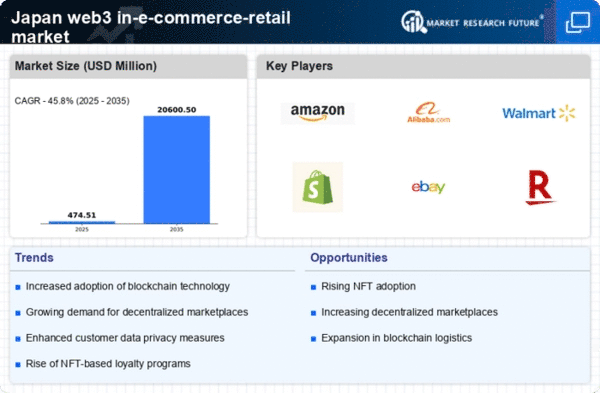Tokenization of Assets
The tokenization of assets is transforming the web3 in-e-commerce-retail market in Japan. By converting physical goods into digital tokens, businesses can facilitate easier transactions and enhance liquidity. This process allows for fractional ownership, enabling consumers to invest in high-value items at lower costs. Reports indicate that the tokenization market could reach a valuation of $4 trillion by 2025, suggesting a substantial opportunity for retailers to innovate their offerings. As more companies explore tokenization, the web3 in-e-commerce-retail market may experience significant growth and diversification.
Enhanced Consumer Privacy
The web3 in-e-commerce-retail market in Japan is witnessing a growing emphasis on consumer privacy. With increasing concerns over data breaches and misuse of personal information, consumers are gravitating towards platforms that prioritize privacy. Web3 technologies, such as blockchain, offer decentralized solutions that enhance data security and give users control over their information. This shift is reflected in a survey indicating that 70% of Japanese consumers prefer platforms that utilize blockchain for transactions. As privacy becomes a paramount concern, businesses that adopt these technologies may gain a competitive edge, potentially increasing their market share in the web3 in-e-commerce-retail market.
Integration of AI and Blockchain
The integration of artificial intelligence (AI) with blockchain technology is becoming a crucial driver in the web3 in-e-commerce-retail market in Japan. AI can analyze consumer behavior and preferences, while blockchain ensures secure and transparent transactions. This synergy allows retailers to offer personalized shopping experiences while maintaining data integrity. A study indicates that businesses leveraging AI and blockchain could see a 20% increase in customer retention rates. As this integration becomes more prevalent, it is likely to enhance operational efficiency and customer satisfaction in the web3 in-e-commerce-retail market.
Rise of Decentralized Marketplaces
Decentralized marketplaces are emerging as a pivotal driver in the web3 in-e-commerce-retail market in Japan. These platforms eliminate intermediaries, allowing for direct transactions between buyers and sellers. This model not only reduces costs but also enhances transparency and trust among users. Recent data suggests that decentralized marketplaces could capture up to 30% of the e-commerce market by 2026. As consumers become more aware of the benefits of decentralized systems, the demand for such platforms is likely to increase, thereby reshaping the landscape of the web3 in-e-commerce-retail market.
Sustainability and Ethical Consumption
Sustainability is increasingly influencing consumer choices in the web3 in-e-commerce-retail market in Japan. As awareness of environmental issues grows, consumers are seeking brands that demonstrate ethical practices and sustainability. Web3 technologies can facilitate transparency in supply chains, allowing consumers to verify the origins and environmental impact of products. A survey shows that 65% of Japanese consumers are willing to pay a premium for sustainable products. This trend suggests that businesses prioritizing sustainability may not only attract a loyal customer base but also thrive in the evolving web3 in-e-commerce-retail market.
















